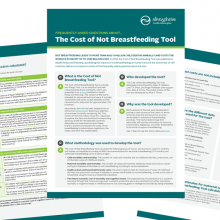Journal article
Apr 26 2021

Misalignment of global COVID-19 breastfeeding and newborn care guidelines with World Health Organization recommendations (Hoang, D.V., 2020. BMJ Nutrition, Prevention & Health)
Guidance documents from 33 countries on newborn care for infants whose mothers are diagnosed with confirmed or suspected COVID-19 were assessed for alignment with WHO recommendations, revealing considerable inconsistencies.
Journal article
Dec 08 2020

Mistakes from the HIV pandemic should inform the COVID-19 response for maternal and newborn care (Gribble, K., 2020. International Breastfeeding Journal)
During the COVID-19 pandemic, policy makers and practitioners must learn from mistakes made during the HIV pandemic, when breastfeeding was undermined through isolating infants from their mothers, and formula feeding resulted in more infant deaths than the disease.
Handout
Oct 14 2020

Frequently Asked Questions about the Cost of Not Breastfeeding tool
Not breastfeeding leads to more than half a million child deaths annually and costs the world economy up to US$1 billion a day.
Journal article
Jul 16 2020

Stop Stunting in South Asia. Improving child feeding, women's nutrition and household sanitation
This overview paper summarizes and builds on papers from the Stop Stunting Conference of 2014, advocating to focus on child feeding, women's nutrition, and household sanitation as investment areas to prevent child stunting in South Asia.
Journal article
Feb 25 2020

The cost of not breastfeeding: global results from a new tool (Walters, D., 2019. Health Policy and Planning)
A billion dollars and two thousand lives, every day. This impactful study, which is the foundation for Alive and Thrive’s online tool, examines the human and economic costs of not breastfeeding.
Journal article
Nov 15 2019

Translating the International Code of Marketing of Breast-milk Substitutes into national measures in nine countries (Michaud-Letourneau, I., 2018. Maternal & Child Nutrition)
This paper investigates how the International Code of Marketing of Breast-milk Substitutes (the Code) was translated from an international policy framework to protect breastfeeding against inappropriate marketing practices into national level legislation, in the context of the advocacy efforts un

